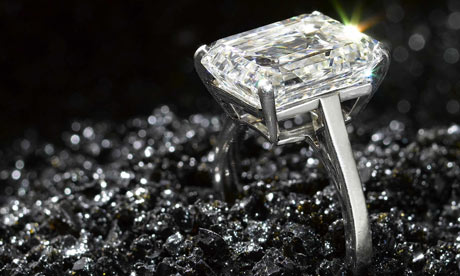
Mumbai, Jul 5: Jewellers in India are banking on a growing appetite for diamonds in the country and resilient demand for gold among its non-residents to offset a slowdown caused by a government clampdown on imports of the precious metal.
Leading jewellers such as Titan Industries and Gitanjali Gems are aggressively promoting diamond jewellery, which uses less gold, and opening more stores in cities such as Singapore and Dubai in an effort to spur sales.
The moves could help create alternative demand sources for the battered yellow metal in the medium term and help somewhat cushion price declines.
"We are moving to diamond jewellery more aggressively, introducing lower-carat jewellery and also pushing silver jewellery," Mehul Choksi, chairman and managing director of Gitanjali Gems, told Reuters.
Gold forms an essential part of a bride's trousseau in India, the world's top consumer of the metal, where it is also considered auspicious for religious rituals. But its imports have contributed to a burgeoning current account deficit.
As a result, India has since May raised gold import duties and tightened credit availability for importers of the precious metal.
After data showed Indians imported a record 162 tonnes of gold in May, jewellers joined a government campaign to cut gold buying.
That, and a weakening rupee, are inflicting pain on jewellers, which they are now seeking to lessen by focusing on new areas.
"Jewellers are thinking of introducing 14-carat jewellery. Low-carat jewellery will help us to control imports as well," said Haresh Soni, chairman of the All India Gems and Jewellery Trade Federation, which groups more than 40,000 members.
Jewellers mix metals like silver and copper to reduce the purity of the yellow metal. Diamond jewellery uses 20-25 percent less gold compared to a normal 22-carat jewellery piece, according to Choksi of Gitanjali Gems.
Diamond jewellery sales are increasing, said Kamal Gupta, director at PP Jewellers in New Delhi, adding rising income of the lower middle-class pushes a switch from gold to diamond.
Demand for the lower-carat jewellery is seen coming mainly from younger consumers, who unlike earlier generations, are not fastidious about buying a 22-carat gold necklace.
Following the government's measures, gold imports by the world's top metal importer in June may be just 37-40 tonnes against a monthly average of 70 tonnes, according to the trade federation's Soni. And imports in July-December may decline by 20-25 percent compared to the first half of this year, he said.
Anticipating further restrictions at home, some jewellers plan to increase their overseas presence to boost sales, especially to non-resident Indians.
"For those who are in the jewellery business, Middle East countries are very attractive now," said Gupta from PP Jewellers. The company is currently "working on" opening stores in Dubai and Singapore, according to Gupta.
Gitanjali plans to open more stores overseas in the United States, Middle East, China and Japan, and expects to increase sales by 50 percent from its international operations over the next 18 months.






Comments
Add new comment